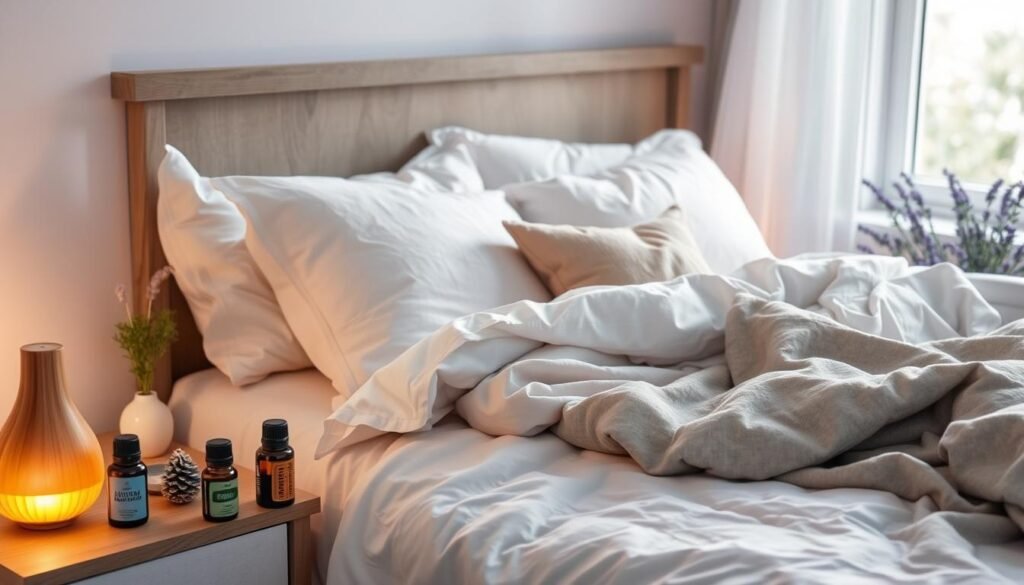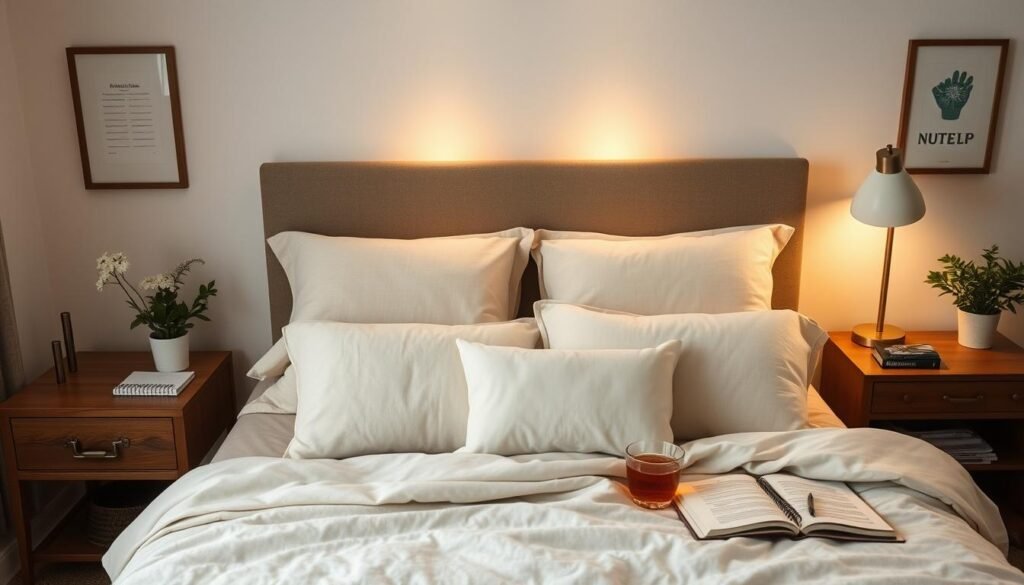Did you know up to 60% of women face sleep issues during menopause? That’s a big number showing how widespread this concern is. Hormone changes mess with sleep, making it hard to find peace at night. This piece sheds light on battling insomnia after menopause. We’ll look into its causes, signs, and ways to fight it. By the end, you’ll learn how to improve your sleep caliber during this crucial life phase.
Key Takeaways
- 35% to 60% of postmenopausal women experience sleep disturbances.
- Hormonal changes play a critical role in sleep disruptions.
- Personalized treatment plans are essential for effective insomnia management.
- Cognitive Behavioral Therapy has shown significant benefits for chronic insomnia.
- Natural remedies and lifestyle changes can promote better sleep quality.
- Prescription medications may provide immediate relief but come with potential side effects.
Understanding Postmenopausal Insomnia
Postmenopausal insomnia affects about 35-60% of women during this stage. They find it hard to fall asleep or stay asleep. This lack of sleep can really impact their day. Sleep issues in menopause are often due to hormonal changes, stress, and lifestyle.
Many women start experiencing sleep problems in perimenopause. They continue into menopause and beyond. Changes in hormones like estrogen and progesterone are common culprits. These lead to night sweats and hot flashes, disrupting sleep. Some women wake up just before a hot flash, not because of it.
Understanding these factors helps us address causes of insomnia. Postmenopausal women are more likely to get sleep apnea than before menopause. Often, their sleep disorder symptoms get mistaken for regular menopause signs. This means they might not get the right diagnosis.
Women tend to have milder sleep apnea symptoms. This can make them less likely to seek help. Yet, improving sleep isn’t impossible. It involves regular exercise and consistent sleep routines. Tips for better sleep include less screen time before bed and managing nighttime fluid intake.
In conclusion, acknowledging postmenopausal insomnia is key. Understanding its causes is the first step to better sleep and health. This can enhance the well-being of women going through this big change.
The Link Between Menopause and Sleep Disorders
Menopause and sleep disorders are closely linked in health discussions today. Hormone changes during menopause significantly affect sleep quality. Many women find it hard to get restful sleep due to menopause-related insomnia caused by lower estrogen and progesterone.
Sleep disorder rates vary through menopausal stages. For premenopausal women, rates are between 16% and 42%. This number jumps to 39% to 47% for perimenopausal women. For those postmenopausal, up to 60% face sleep issues. Also, 75% to 85% of postmenopausal women deal with vasomotor symptoms, worsening sleep disruptions.
Obstructive sleep apnea (OSA) affects 47% to 67% of postmenopausal women. Hormonal changes affecting sleep start 7 to 10 years before menopause. Studies show lower melatonin levels in postmenopausal women with insomnia, compared to premenopausal ones.
Hormonal changes also impact physical health. Weight gain is common in postmenopausal women, leading to a bigger neck and higher body mass index. This increases OSA risks. So, addressing menopause-related insomnia is crucial for good sleep and overall health.
| Menopausal Stage | Prevalence of Sleep Disorders | Vasomotor Symptoms | OSA Incidence |
|---|---|---|---|
| Premenopausal | 16% to 42% | Not applicable | Not applicable |
| Perimenopausal | 39% to 47% | Higher likelihood | Not applicable |
| Postmenopausal | 35% to 60% | 75% to 85% | 47% to 67% |
It’s crucial to understand menopause’s impact on sleep disorders. Knowing these challenges helps create better solutions for sleep quality during menopause.
Symptoms and Impact of Insomnia During Postmenopause
Postmenopausal insomnia shows through various symptoms of insomnia that deeply affect day-to-day life. Women often find it hard to fall asleep, wake up many times at night, and rise too early. These sleep issues cause more tiredness, mood swings, and less sharp thinking. Insomnia might also raise the chance of getting heart disease and becoming overweight. It’s vital to see how sleep problems hit women during this time.
Statistics point out a problem. Women are twice as likely to get major depression due to hormone changes. As many as 61% of women going through menopause have sleep troubles. Insomnia’s effects can be harsh, making depression up to 10 times more likely. Symptoms include long-lasting sadness, little appetite, extreme tiredness, and, of course, trouble sleeping.
Living healthy and getting the right treatment can tackle these hard symptoms. Knowing the consequences of insomnia helps in finding better ways to deal with it. Tailoring treatments can improve the overall health and sleep of women in their postmenopausal years.
Postmenopausal Insomnia Treatment
Treating postmenopausal insomnia takes more than one approach. Many women struggle with sleep issues during and after menopause. Treatments range from cognitive therapies to medication. With around 60% of women facing insomnia at this stage, finding effective solutions is key.
Overview of Treatment Options
There are different ways to tackle postmenopausal insomnia. Some of the most effective ones include:
- Cognitive Behavioral Therapy (CBT): CBT works by changing the negative thoughts and habits that disrupt sleep.
- Hormone Replacement Therapy (HRT): HRT helps balance hormones, which can improve sleep and ease other symptoms like hot flashes.
- Medications: Some sleep medications help in the short term but might not be the best long-term solution because of side effects.
- Natural Remedies: Simple changes, like keeping the bedroom cool and practicing relaxation techniques before bed, can make a big difference in sleep quality.
Importance of Personalized Treatment Plans
Custom treatment plans are essential for beating postmenopausal insomnia. Each woman’s symptoms and experiences are unique. A plan tailored to her specific situation ensures the best care. Health providers can mix different therapies for better results.
Want more info on managing sleep issues during menopause? Check out this resource.

Hormonal Changes and Their Effects on Sleep
Hormonal changes greatly influence sleep problems in women during menopause. The drop in hormones such as estrogen and progesterone affects sleep patterns. This leads to trouble sleeping. About 35% to 60% of postmenopausal women struggle with insomnia, highlighting a critical time for sleep health.
Estrogen levels impact sleep in complex ways. Lower levels can disturb sleep quality and lower melatonin production. This makes falling and staying asleep harder. In women going through peri-menopause, 39% to 47% report sleep issues. This shows the strong link between menopause and wellbeing.
Surgical menopause can cause sleep problems too, regardless of age or the time since surgery. The most frequent issue is waking up often during the night. Hot flashes, affecting 75-85% of menopausal women, worsen sleep problems. Interestingly, disturbed sleep can lead to more hot flashes, leaving women in a challenging cycle.
Understanding hormonal changes helps in tackling insomnia. Seeking advice from a healthcare professional can offer specific ways to manage these changes and sleep better. Knowing how hormones affect sleep is key to creating effective treatment plans. This can help women enjoy more restful nights during menopause.
Insomnia during menopause is also influenced by psychological factors like mood and health perception. The challenges extend beyond just having trouble sleeping. This underscores the importance of wide-ranging support for women.
For detailed information on managing this condition, consider visiting expert resources. There, you can find a variety of treatment options.
Effective Medications for Postmenopausal Insomnia
Managing postmenopausal insomnia often needs a mix of prescription drugs. These aim to better sleep quality and lessen disruptive symptoms. It’s important to know the different treatment options. Here are some medicines doctors often prescribe for insomnia in the postmenopausal phase.
Prescription Medications Overview
Prescription medications for insomnia may include:
- Zolpidem (Ambien) – A widely used sedative-hypnotic, effective for short-term treatment.
- Eszopiclone (Lunesta) – Helpful for those needing to stay asleep longer.
- Ramelteon (Rozerem) – A melatonin receptor agonist that can help regulate sleep-wake cycles.
- Gabapentin (Neurontin) – Known to improve sleep quality and alleviate symptoms like hot flashes.
These treatments target specific sleep issues, like insomnia due to hormone changes or night sweats. While helpful, they have risks too.
Potential Side Effects of Sleep Medications
It’s key to understand sleep medication side effects for safety. Common side effects include:
| Medication | Common Side Effects |
|---|---|
| Zolpidem | Drowsiness, dizziness, potential dependence |
| Eszopiclone | Aftertaste, headache, dizziness |
| Ramelteon | Fatigue, sleepiness, hormonal effects |
| Gabapentin | Drowsiness, dizziness, fatigue |
Taking these treatments can lead to dependency, tolerance, or mental effects, especially in older women. Regular checks by doctors are vital to lower these medication risks.

Exploring Hormone Therapy for Sleep Improvement
Hormone therapy offers hope for women with sleep troubles during menopause. It works by balancing estrogen and progesterone levels, critical for good sleep. Studies show it helps ease sleep issues, boosting mood and well-being too.
The advantages of this therapy stand out for women facing hot flashes and night sweats. One study found these symptoms can last over seven years. Effective treatment is key to better sleep. For women aged 50 to 64, about 25% report sleep problems, with 15% having severe issues.
Around 996 women between 55 and 64 have tried systemic hormone therapy. The study showed 24.7% experienced frequent wake-ups at night. This highlights the struggle with insomnia and the potential of hormone therapy for relief.
Before starting hormone therapy for insomnia after menopause, it is vital to talk with doctors. Understanding both the benefits and risks helps in making an informed choice. This leads to better sleep.
Cognitive Behavioral Therapy for Postmenopausal Insomnia
Cognitive Behavioral Therapy for Insomnia (CBT-I) is a top choice for postmenopausal women with sleep issues. It focuses on altering behaviors and thoughts that interfere with sleep. CBT-I promotes good sleep habits and tackles insomnia’s complex causes without drugs. Studies show it can improve sleep quality over time.
Benefits of CBT for Sleep Disorders
CBT-I offers many benefits for women facing insomnia during menopause. Some key advantages are:
- Falling asleep faster.
- Enhanced quality of sleep.
- Lower chances of insomnia coming back.
- Learning skills to maintain healthy sleep long-term.
CBT-I not only provides immediate help but also secures lasting good sleep habits.
How CBT Compares to Traditional Medications
CBT-I and sleep meds are quite different. Medications might work quickly but can cause dependency and side effects, like feeling groggy the next day. The FDA even cut recommended doses of drugs like zolpidem due to these risks. On the other hand, CBT-I is generally safe and risk-free when done right.
Plenty of research shows CBT-I is more effective for sleep without medication’s downsides. Therefore, it’s a better, safer choice for many women who have trouble sleeping after menopause.

Want to learn more about CBT techniques for better sleep? Check out this resource.
Natural Remedies for Postmenopausal Insomnia
Many women find it hard to sleep well as they go through menopause. This is due to changes in their hormones. There are natural ways to make sleep better during this time. These range from taking supplements to making changes in daily habits.
Supplements and Herbal Approaches
Adding sleep supplements to your nighttime routine may help you sleep better. Melatonin is a common choice for fixing sleep schedules. Herbs like valerian root, chamomile, and lemon balm are also popular. Studies show that chamomile drops can help you fall asleep faster and sleep longer.
Using both lemon balm and valerian can greatly improve sleep. Other options, such as ashwagandha and tart cherry juice, work too. They help make more melatonin and reduce stress.
Lifestyle Changes for Better Sleep Quality
Changing your lifestyle can also make your sleep better. Doing regular aerobic exercise leads to deeper sleep. But, it’s best not to exercise too hard right before bed. Sticking to a regular bedtime also helps your body’s clock stay on track, which improves sleep length.
Making your bedroom better for sleep is important, too. Keep your room at a comfy temperature, between 65 and 72 degrees Fahrenheit. Also, cutting down on caffeine and alcohol before bed helps you stay asleep.
Trying these natural remedies and changes can really help with sleeplessness after menopause. For more on herbal solutions for sleep, check out this useful resource. It has lots of information for women.
Establishing Good Sleep Hygiene Practices
Good sleep hygiene is crucial for postmenopausal women with insomnia. Following sleep hygiene tips for postmenopausal insomnia help enhance sleep quality. This makes sleep more restorative. Building a healthy sleep pattern begins with creating a sleep environment that is comfortable and calm.
Creating a Sleep-Conducive Environment
Creating the perfect sleep setting greatly affects sleep quality. It’s important to focus on several key points:
- Temperature Control: Keep the bedroom cool to help fall asleep easier.
- Noise Reduction: Use white noise machines or earplugs to block out sound.
- Lighting: Dim lights and use blackout curtains for darkness at sleep time.
- Screen Time Limitation: Avoid screens at least one hour before bedtime to help your sleep cycle.
Addressing these factors can greatly improve the chances of a peaceful sleep. A quiet environment is essential for a good night’s rest.
Techniques to Promote Relaxation Before Bedtime
For better sleep, add relaxation techniques for sleep to your bedtime routine. Here are some effective methods:
- Progressive Muscle Relaxation: Tense then relax each muscle group to ease tension.
- Deep-Breathing Exercises: Deep breathing helps calm your mind and body.
- Mindfulness or Meditation: Mindful practices help focus your thoughts and lessen anxiety.
- Gentle Stretching: Soft stretches ease body tension and boost blood flow.
Using these relaxation strategies helps you fall asleep more easily. Focusing on good sleep hygiene can greatly benefit overall health.
Conclusion
Addressing insomnia after menopause needs a mix of traditional and complementary methods. It’s essential for women with sleep problems to see healthcare providers. These professionals can develop tailored treatment plans that consider various factors.
Treatments like eszopiclone have been effective in improving sleep. In one study, 87% of those treated had better sleep scores, unlike with a placebo. It shows that right therapies make a big difference for postmenopausal women.
Lifestyle changes and natural remedies are also key. They greatly help in dealing with insomnia during this time. By choosing the right medications, therapies, and daily activities, women can greatly improve their sleep quality. Thus, taking a broad approach to dealing with insomnia helps women boost their life quality during and after menopause.